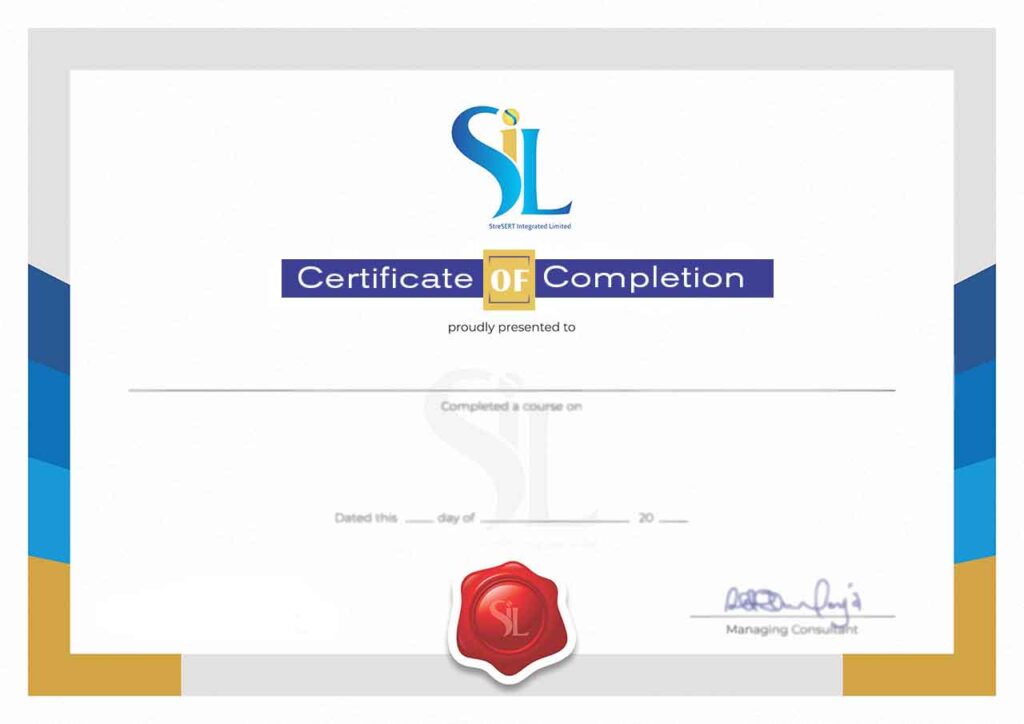FINANCE FOR NON-FINANCE PROFESSIONALS
Instructor: Industry Expert-Led
Group enrollment is available for Teams. Learn more
Professional Course
Certificate Ready
Our comprehensive Certificate-Ready Course is designed to equip you with the knowledge, expertise, and credentials you need to excel in your field
Virtual & Physical Classroom
Virtual and Physical Classes. Whether you prefer the convenience of studying from the comfort of your home or the interactive experience of an in-person classroom, we have you covered.
+234 806 788 0956
Do you have any questions about the course? Talk to our Expert now
What you'll learn
Business leaders and executives need to understand the financial factors that are essential to a company’s success. Every business’ long-term competitiveness and performance depend heavily on profitability, liquidity, and financial structure. As a result, at all levels of economic activity, these three components are carefully examined and developed.
To comply with regulatory requirements, you will learn about the accounting practices for recording and reporting business transactions, as well as how they are compiled in monthly financial reports. Additionally, you will discover how various user groups rate financial reporting.
From a professional viewpoint, this training course for non-financial professionals will investigate why management accounting is critical to a company’s survival and success. It will discuss how budgeting may aid in cost control and profitability. It would simplify the process and develop tools and rules for evaluating new investment proposals. Thanks to this training course, you will be able to understand the business from a financial and strategic standpoint, as well as how business operations may affect overall corporate profitability.
This training course will highlight
- The strategic and operational role of the finance function
- Principles of accounting and financial reporting
- The understanding and interpretation of financial statements
- The role management accounting play in maintaining order and boosting output
- How to make sure that investment returns meet shareholders’ expectations
Objectives
At the end of this training, you will learn to:
- Describe the significance, role, and purpose of financial statements.
- To effectively interact with financial experts, and learn to speak their language.
- Analyse a company’s financial situation and performance using proper financial indicators and break-even analysis tools.
- Using budgetary control to compare actual performance to projected performance and determine corrective actions.
Training Methodology
By utilising a variety of effective learning, teaching and facilitation tactics, participants in this course will receive thorough instruction on the subjects included in the outline. The training course technique includes active presentations, interactive activities, self-assessment diagnostics, targeted video presentations, and interactive discussions.
Organisational Impact
The organisation will benefit from attending this training session:
- Increased grasp of finance and accounting operations.
- Comprehension of how accounting systems and financial reporting are organised
- Capacity to participate more intelligently and effectively in financial discussions
- The ability to use tools and procedures for financial management and control a better understanding of the fundamental variables assuring long-term growth and competitiveness
- Understanding of business risk detection, analysis, and management strategies.
Personal Impact
The individual will benefit from attending this training session:
- Better knowledgeable about financial systems, accounting, and the significance of financial data and reports.
- Greater availability of financial information to support executive decision-making.
- Increased proficiency in speaking the financial language and taking part in financial talks.
- Able to contribute to the organisation’s good financial management by evaluating possibilities and choosing the best ones for potential organisational advancement.
- Able to communicate with departments more effectively on financial issues.
Who Should Attend?
This training course is suitable for professionals in any industry, and will greatly benefit:
- Managers of sales and marketing
- Personnel in supply chain project management
- Internal auditors
- Anyone who is required to read, comprehend, and contribute to corporate financial reporting but is not a financial expert
- Expertise in production, marketing, and engineering
- Human resource professionals
- Legal professionals
- Executives focusing on developing long-term connections with clients, vendors, outsourcing partners, and other foreign strategic alliances.
- Consultants who work with executives and professionals to enhance operational and financial process improvements.
Course Details
Day 1
- The component of financial management.
- Putting together a comprehensive financial plan
- Financial and management accounting’s role.
- What the CEO does to help with corporate governance.
- Financial data for the company, both internal and external
- The fundamental elements of yearly financial reports.
- Financial statement analysis.
- Working capital management
- Making cash flow and free cash flow calculations
- Using ratios and other important metrics to forecast business failure
- Short-term vs long-term finance concepts.
- Debt versus equity sources, and funding methods
- Calculating the Cost of Long-Term Finance
- Dividend valuation model at the cost of equity
Day 2
- Capital Asset Pricing Model.
- Acquisitions, mergers, and joint ventures.
- Investigating different restructuring techniques such as demergers, spin-offs, and unbundling.
- Capital Investment plan.
- Inflation, capital rationing, risk, and uncertainty.
- Management of risk and uncertainty.
- The purpose of budgeting and its importance.
- Development, negotiation, and execution of budgetary controls.
- Evaluation of Variance.
- Making decisions with a budget’s assistance: Break-even analysis and Cost, Volume, and Profit (CVP) analysis.
Frequently asked questions
a. How do I register for the course?
To register for the course, please visit our course webpage and click on the “Register” button. Follow the instructions provided to complete the registration process.
b. What should I do if I encounter problems while registering?
If you encounter any issues during the registration process, please reach out to our support team at [email address] or [phone number]. They will assist you in resolving the problem and completing your registration.
c. I didn’t receive a confirmation email after registration. What should I do?
Please check your spam or junk folder for the confirmation email. If you still haven’t received it, kindly contact our support team with your registration details, and they will assist you in ensuring you receive the confirmation.
a. Can I register as a team or group for the course?
Yes, we offer the option for team or group registration. You can enroll multiple members together as a team for the course.
b. What is the maximum number of members allowed in a course team?
The maximum number of members allowed in a course team may vary depending on the specific course. Please refer to the course details or contact our support team for more information.
c. How do we register as a team, and is there a separate process for team registration?
To register as a team, please visit our course webpage and look for the team registration option. Follow the instructions provided to register your team. The process may involve submitting the details of each team member. If you require any assistance, please reach out to our support team.
a. What topics are covered in the course?
The course covers a comprehensive range of topics related to [specific course subject]. Some of the key areas covered include [list key areas/topics covered in the course]. For a detailed breakdown of the course content, please refer to the course syllabus on our website.
b. Is the course self-paced, or does it have a fixed schedule?
Our course offers a flexible learning experience. It is designed to be self-paced, allowing you to study at your own convenience and progress through the materials at your preferred speed. You can access the course content and complete assignments within the provided timeframe.
c. Are there any prerequisites for taking this course?
Some courses may have prerequisites or recommended prior knowledge. Please refer to the course details or prerequisites section on our website to determine if there are any specific requirements for this course.
d. Can I access the course materials after the course completion?
Yes, you will have access to the course materials for a specified duration even after completing the course. This allows you to review the content, revisit key concepts, and continue learning at your own pace.
a. How long does the course last?
The duration of the course varies depending on the specific program. It can range from a few weeks to several months. Please refer to the course details or contact our support team for the exact duration of this course.
b. How many hours per week should I dedicate to the course?
The recommended time commitment per week for this course is approximately [number] hours. However, as the course is self-paced, you can adjust your study schedule based on your availability and learning preferences.
c. Can I complete the course at my own pace?
Absolutely! The course is designed to be flexible, allowing you to complete the modules and assignments at your own pace. You can study at a speed that suits you and fits your schedule.




